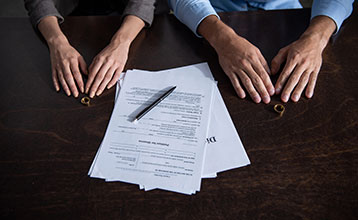Annulment is a legal process that ends a marriage. The consequence is that the marriage in effect never existed. After the annulment, the parties’ marital status will return to being “single,” as if the marriage never happened. Whilst the process of a Divorce also ends a marriage, it is different from annulment.
A divorce ends a marriage that was legally valid before the divorce order. An annulment declares that the marriage was never legally valid to begin with.
In divorce proceedings, the parties need to show that their legally valid marriage has broken down irretrievably to get a divorce order. In annulment proceedings, the parties must show that the marriage was not legal or valid from the start.
To understand the annulment process in Singapore, we need to understand the two categories of marriage that form the grounds for annulment: void and voidable marriages.
The law regarding annulments in Singapore
In Singapore, annulment is governed by Chapter 3 of the Women’s Charter. Sections 105 and 106 set out the grounds which makes a marriage void or voidable.
Void marriages are invalid from the start, even if you don’t formally annul the marriage. However, your marital status will be “married” until the marriage is declared null in court. Legally, a void marriage never existed, but most couples will seek a formal declaration of nullity from the Family Justice Court.
Voidable marriages exist until it is voided. It needs a decree of nullity to dissolve. It can continue to exist until one party seeks a declaration of annulment.
What are the requirements for annulment of marriage?
Annulling a marriage has significant consequences. Therefore, the law in Singapore has strict requirements before granting a declaration of nullity. The criteria differ depending on whether the marriage is void or voidable.
When is a marriage void?
Although the marriage is invalid to start with, sec 104 provides that a party to a void marriage can apply to the court for a judgment of nullity to confirm that the marriage is null and void. To prove that the marriage is invalid, the applicant must show that the marriage did not meet the requirements for a valid marriage.
Sec 105 sets out the following grounds on which a marriage will be void.
Sec 105(a) – a marriage after 1 June 1981 where the following sections apply:
- Sec 3(4) – the marriage is between Muslims that are registered or solemnised under the Women’s Charter, instead of under Muslim law.
- Sec 5 – polygamous marriages as referred to in sec 4 (marriages on or before 15 Sept 1961).
- Sec 9 – one party was younger than 18 years old at solemnisation, and it was not authorised by a special marriage license granted by the Minister under Section 21 of the Women’s Charter.
- Sec 10 – the parties are within prohibited degrees of relationship as set out in the First Schedule of the Women’s Charter (i.e., relatives).
- Sec 11 – On the marriage date, one of the parties was already married under any law, religion, custom, or usage to someone else.
- Sec 12 – the parties are of the same sex.
- Sec 22 – the solemnisation did not comply with the requirements of the law in Singapore.
- Sec 105 (aa)
A marriage invalid under sec 11A – a marriage of convenience only. Where one party obtains an immigration advantage, or a party receives a gratification as an inducement or reward to enter into the marriage.
- Sec 105 (b)
The marriage was celebrated outside Singapore and is invalid due to:
- lack of capacity; or
- the law of the place in which the marriage was celebrated.
When is a marriage voidable?
Unlike a void marriage, a voidable marriage is legally valid until a party applies for a judgment of nullity.
Marriages that took place after 1 June 1981 are voidable under sec 106 if:
- Sec 106 (a) – The marriage has not been consummated as either party is incapable of doing so.
- Sec 106 (b) – The marriage has not been consummated as the defendant refuses to do so.
- Sec 106 (c) – Either party did not validly consent to the marriage due to duress, mistake, mental disorder or otherwise.
- Sec 106 (d) – At the time of the marriage, either party was capable of giving valid consent, but suffered from a mental disorder within the meaning of the Mental Health (Care and Treatment) Act 2008 so as to be unfit for marriage.
- Sec 106 (e) – At the time of the marriage, the defendant was suffering from a transmissible form of venereal disease.
- Sec 106 (f) – At the time of the marriage, the defendant was pregnant by someone other than the plaintiff.
Are there time limits to apply for an annulment?
If the marriage is void, there are no time limits to apply for a declaration of nullity.
If you are applying for an annulment of a voidable marriage, you must do so within three years. However, if you allege that the marriage has not been consummated due to the defendant refusing to do so, or either party being incapable of doing so, there is no time limit. You can apply for annulment no matter how long you’ve been married.
What is the process for applying for annulment?
Sec 104 provides that either spouse may file a writ claiming for a judgment of nullity. You must include the following documents:
- statement of claim setting out your grounds for an annulment;
- statement of particulars setting out the facts you are relying on;
- a proposed or agreed parenting plan if you have children; and
- if you have an HDB flat, a matrimonial property plan with your proposed arrangements for the HDB flat. (You might have to surrender the HDB flat if you have not fulfilled the minimum occupation period).
Usually, an annulment is a two-step process. If the court is satisfied with the grounds for annulment, it may grant an interim judgment.
After that, the ancillary matters (the division of property, maintenance, and child custody) must be settled. When the court is satisfied with the arrangements around property and the welfare of the children, a judgment of nullity may be granted.
For uncontested annulments, the process usually takes 4-6 months. If the other spouse contests the application, it may take much longer.
Can the court refuse to grant an annulment?
To annul your marriage, you must produce sufficient evidence to show that the marriage is void or voidable. If you allege and prove that your marriage is voidable, the court may still refuse to grant an annulment if:
- granting an annulment would be unjust to the defendant; or
- the plaintiff knew they could annul the marriage but behaved in such a way that the defendant reasonably believed that the plaintiff would not do so.
In ss 106(e) or (f) cases, the court will not grant a judgment of nullity if the plaintiff knew at the time of the marriage:
- that the defendant suffered from a transmissible venereal disease; or
- that the defendant was pregnant by someone else.
What about children born to a void or voidable marriage?
The children born to a voidable marriage are still considered legitimate.
Children born to a void marriage are also considered legitimate provided that the parties believed that the marriage was valid when they got married.
What if my application for annulment is denied?
If you have been married for more than three years, you can apply for a divorce.
If you have been married for less than three years, you can separate until you have been married for at least three years and then file for divorce.
You may also apply for a divorce before three years if you can prove that you are suffering from exceptional hardship or that the defendant is guilty of exceptional depravity.
Annulment is not a quick alternative to divorce. There are strict requirements, and the criteria can be complex and confusing. If you think that your marriage is void or voidable, you should seek legal assistance to understand your options. An experienced lawyer will help you understand the law and the process to follow to obtain a judgment or a declaration of nullity.


